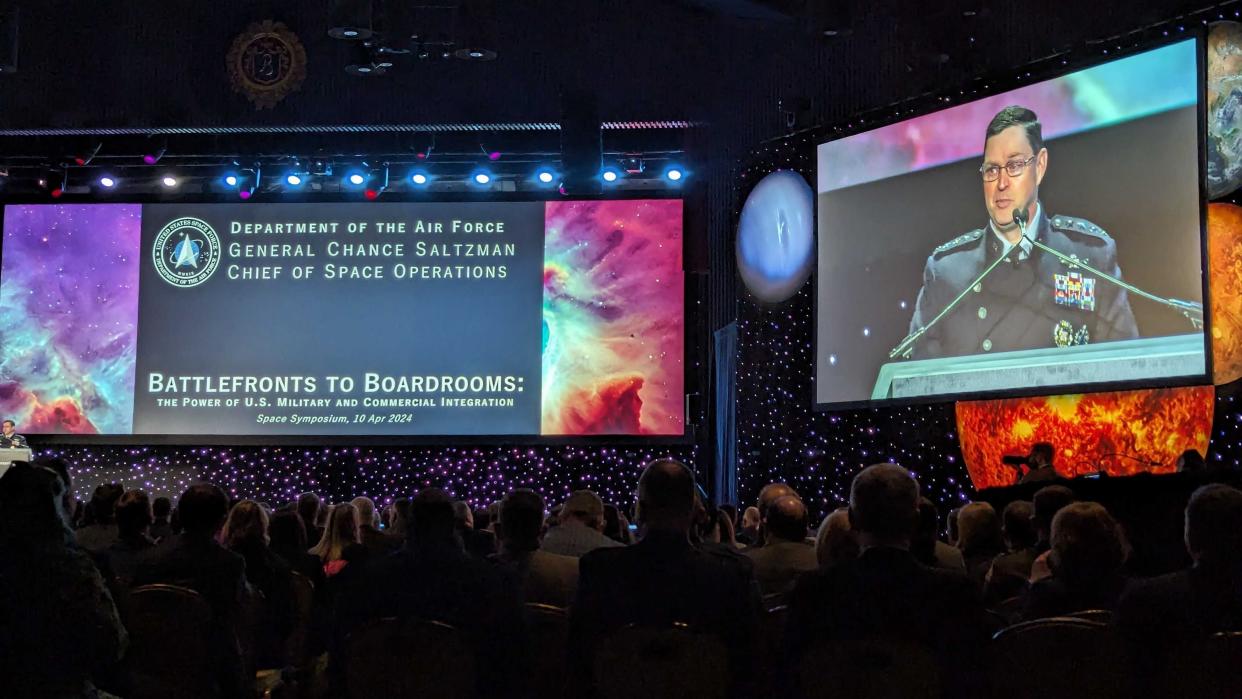US needs new space tech or it 'will lose,' Space Force chief says

COLORADO SPRINGS, Colo. — The United States must harness emerging technological capabilities if it wants to avoid losing a future conflict against its adversaries, the head of U.S. Space Force warned.
Gen. B. Chance Saltzman, Chief of Space Operations for the U.S. Space Force, gave a speech at the Space Foundation's annual Space Symposium here in Colorado Springs on Wednesday (April 10) that stressed the need for the service to be able to partner with commercial industry to rapidly develop and field new space-based capabilities.
The best and fastest way to do that, Saltzman said, is to strengthen the service's relationship with commercial industry. "The Space Force must harness the benefits of technological innovation and emerging capabilities if we're going to be able to out-compete our competitors, or Space Force will lose, the Joint Force will lose and the U.S. will lose."
Related: Space is now 'most essential' domain for US military, Pentagon says
The need for rapid innovation in space is driven by the fact that the U.S. finds itself in a new era of "great power competition" with its main potential adversaries, Russia and China, Saltzman said, citing Russia's ongoing invasion of Ukraine to underscore why the nation needs to strengthen its presence in space.
"As Russia has reminded us, war can return quickly and in unexpected ways," Saltzman said during his speech, adding that "cooperation among industry leaders and allies has proven particularly effective in challenging Russia's efforts in Ukraine."
But that cooperation is nothing new. "Throughout our nation's history," Saltzman said, "military success has hinged on support from commercial industry."
The Chief of Space Operations cited the examples of the U.S. Navy partnering with the coal industry during the Spanish-American War, and, more recently, how the U.S. Air Force has partnered with commercial satellite operators Inmarsat and Intelsat to increase its military communications bandwidth.
Using those historical examples, Saltzman said Space Force is looking to the future, seeking to modernize its capabilities through increasing and strengthening commercial partnerships.

As part of the effort to modernize Space Force's capabilities, the service released a new Commercial Space Strategy document today (April 10) to help it better interface with industry partners to increase America's competitive advantage in space.
Saltzman described the document as a tool that will "strengthen interoperability between government commercial solutions without stifling commercial sector innovation, speed or scale."
The document outlines four major lines of effort: Collaborative Transparency; Operational and Technical Integration; Risk Management; and Secure the Future. These will allow the service to develop "more resilient and combat-capable architectures while deploying them faster, in greater numbers, and at a lower cost," said Lt. Gen. Shawn Bratton, deputy chief of Space Operations, Strategy, Plans, Programs, and Requirements, in a statement announcing the document.
RELATED STORIES:
— China moving at 'breathtaking speed' in final frontier, Space Force says
— US Space Force creates 1st unit dedicated to targeting adversary satellites
— Pentagon moves to declassify some secret space programs and technologies
Even with this new strategy in mind, modernizing Space Force's technological capabilities will remain a challenge due to the nature of military funding, which relies on Congress and the whims of politics. Furthermore, Saltzman noted, "as we all understand, there is never enough money to go around."
In a separate speech at Space Symposium prior to Saltzman, Secretary of the U.S. Air Force Frank Kendall underscored the service's frustration with the budgetary process and the delays it can cause in terms of developing and acquiring new technologies.
"Over the last 15 years, we have given up five years, a third of the available time, while we operated under continuing resolutions and waiting for new funding and authorizations to arrive," Kendall said. "It's tough to win a race when you give the adversary such an advantage."
"The system as a whole has been holding us back," Kendall added.
